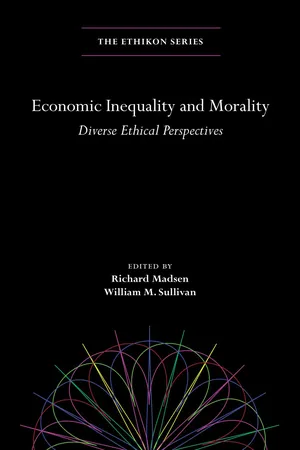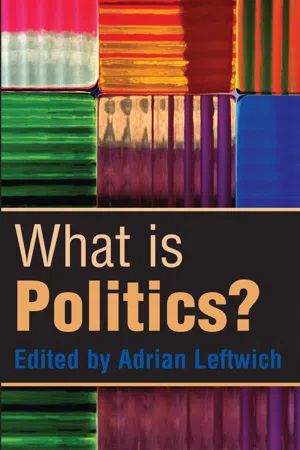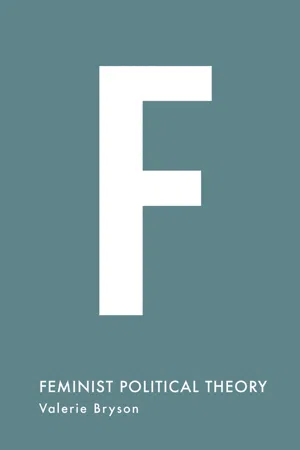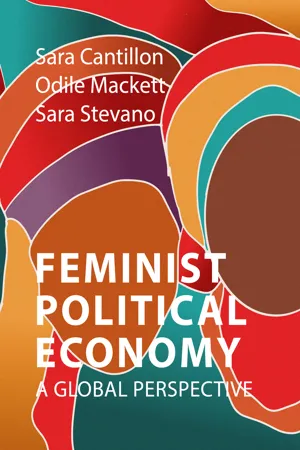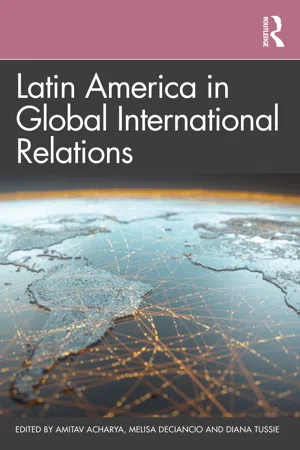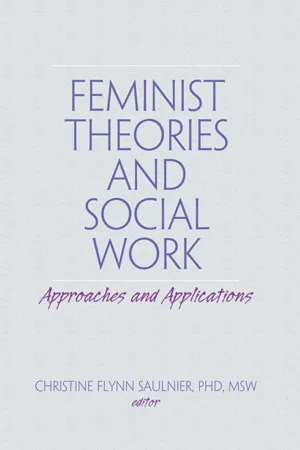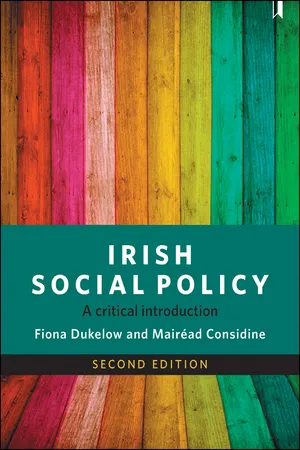Politics & International Relations
Socialist Feminism
Socialist feminism is a political movement that seeks to address the dual oppressions of gender and class. It emphasizes the intersectionality of gender and economic inequality, advocating for the dismantling of capitalist structures and the redistribution of wealth and power. Socialist feminists aim to create a society where both gender and economic equality are achieved through collective action and social transformation.
Written by Perlego with AI-assistance
Related key terms
1 of 4
Related key terms
1 of 3
9 Key excerpts on "Socialist Feminism"
- eBook - ePub
Economic Inequality and Morality
Diverse Ethical Perspectives
- Richard Madsen, William M. Sullivan(Authors)
- 2019(Publication Date)
- Brookings Institution Press(Publisher)
Readers may also be interested to know that two of the authors frequently cited in this chapter, Nancy Fraser and Iris Marion Young, claim sympathetic alliance with the project of socialism. In their case, however, that alliance does not exhaust or completely account for their distinctive theoretical contributions. The same could be said for Susan Moller Okin, who worked within the political-theoretical frame of liberalism and pushed it much farther than many thought it could go. Martha Nussbaum, who has played a key role in developing the capabilities approach, proclaims her affinity with liberalism and also quotes the young Marx in several of her books. Labeling her a liberal feminist does not do much to advance appreciation for, as well as criticism of, her work. Thus, labels are to be avoided, unless they are actually helpful. Finally, I would note that this chapter offers a selective account of feminist perspectives on economic inequality. On the one hand, feminist thought is not always or exclusively concerned with economic issues. Thus, many other aspects of feminism will not be discussed in this chapter. On the other hand, economic justice has figured as a key concern for many feminists, and especially as a result of the emergence and consolidation of capitalist economies. The historical record offers rich documentation of women’s critical and proactive engagement with the economic and social dislocations of industrial capitalism, particularly as these impacted women and children. During the early twentieth century, Marxist women activists in Europe and Russia, as well as Progressive-era social feminists in the United States, devoted considerable attention to improving the economic prospects for women in their societies. Today, in the context of globalization and neo-liberalism, women and feminists in nearly all regions of the world are grappling with their implications - eBook - ePub
What is Politics?
The Activity and its Study
- Adrian Leftwich(Author)
- 2015(Publication Date)
- Polity(Publisher)
Thus, if there is a distinctively feminist answer to the question ‘what is politics?’ it is, in light of the argument above, an answer that takes two parts. The first part entails an endorsement of the ubiquity of politics, from which there follows a determination to reveal the artificial and unsustainable nature of existing attempts to maintain strong boundaries around a political realm. The second part entails a commitment to exploring and advocating ways in which social relations might be ordered differently, such that they embody a norm of gender justice.Feminists have tended to accept the broad conception of politics, taking this as a reality from which they go on to address the normative question of how to change the diverse spheres of social relations in pursuit of gender justice. One should not, however, expect to find any great consensus in relation to the second part of the answer to ‘what is politics?’, for here there is significant normative dispute – as befits politics. Even within the early second-wave women’s movement, serious division emerged between socialist and radical feminists, with socialist feminists emphasizing the importance of childcare, family allowance, women organizing in paid work, and women’s control over their own fertility and sexuality, and radical feminists emphasizing violence against women as the central issue (Segal, 1987: 46). Such divisions have only increased and become more complex with the increased awareness of ‘intersectionality’ and the diversity of women’s experiences and commitments. So one should resist the temptation to assume that feminists share a common political agenda. If feminists have a distinctive shared contribution to make to the debate about the nature of politics, it is perhaps in assuming a critical function, casting doubt on the presumed immutability of existing social relations, thereby rendering them political. - eBook - ePub
- Valerie Bryson(Author)
- 2016(Publication Date)
- Bloomsbury Academic(Publisher)
Perestroika (restructuring) again placed women’s issues on the political agenda. By this time, however, the Marxist orthodoxy that women’s liberation required economic independence and full participation in the economy was largely rejected in favour of a renewed emphasis on their traditional role within the home. Contrary to the classic Marxist position, it was now argued that women’s double burden should not be resolved by collective housework and childcare but by increasing their opportunity for part-time and flexible working arrangements. The official Soviet line now emphasised natural differences rather than equality between men and women and argued that, both for their own benefit and for that of society as a whole, women should be enabled to fulfil themselves in the traditional roles of mother, wife and homemaker (see Buckley, 1989; Rosenberg, 1989; Waters, 1989). Although a few Soviet sociologists said that feminists should try to re-examine Marxist concepts and use them in their analysis (see Voronina, 1989), most abandoned any kind of Marxist or socialist approach to women’s situation. This retreat from Marxism was completed by the collapse of communism throughout Eastern Europe and the disintegration of the Soviet Union. It is to the west that we must therefore look for any advances in socialist feminist thought in this period.By the 1960s, the rise of the New Left, associated with the Civil Rights, anti-war and student movements, provided fertile ground for an exploration of socialist ideas which distinguished between ‘genuine’ socialism and the repression of so-called communist states. Earlier socialist and Marxist feminist analyses had, however, largely been forgotten in the west too, and left-wing activist men in the late 1960s were quite unprepared for the new radical feminist attack which denounced their political practice as sexist, and claimed that their theories were patriarchal ideologies that served to conceal the reality of women’s oppression. Some initially responded with ridicule, or argued that feminism could only be a bourgeois deviation that divides the workers and distracts them from the class struggle; others simply ignored feminism, apparently in the belief that it would somehow ‘go away’. However, many women refused to believe that sexism was inherent in socialist principles; rather, they believed that socialist theory could be used to address feminist concerns. Their attempts to develop such theory is the focus of this chapter.In discussing such approaches, confusion often arises from the number of different ways in which the terms ‘socialist feminist’ and ‘Marxist feminist’ have been used. It should by now be clear that in practice ideas, institutions and movements cannot be neatly classified, and I am therefore not attempting to establish ‘correct’ definitions. Throughout this book, I use ‘Marxist feminist’ fairly loosely to refer to all feminist theories which employ Marxist concepts, even if they develop these in radical ways, and ‘socialist feminist’ as a more general term that includes all approaches (including Marxist feminist) that see the goals of feminism as inseparable from socialism (however defined). In practice, the lines between Marxist and Socialist Feminisms are shifting and blurred. Although this chapter traces a general development from attempts to fit feminist concerns into a Marxist framework and towards more independent and open-ended analysis (at times almost indistinguishable from postmodernism), this should not be seen as a rigid pattern. - eBook - ePub
Feminist Political Economy
A Global Perspective
- Sara Cantillon, Odile Mackett, Sara Stevano(Authors)
- 2023(Publication Date)
- Agenda Publishing(Publisher)
For many feminists, gender inequality cannot be seen in isolation from mainstream economic issues. Marxist feminist traditions have long studied the interplay of gender and class; Black feminisms have centred the critical importance of race with Angela Davis’ Women, Race and Class, first published over 40 years ago (Davis 1981), which is emblematic of this. Current feminist scholarship and activism draw on these lines of engagement and extend them into the context of globalized and financialized capitalism. For example, social reproduction feminisms seek to put forward a unitary understanding of gender oppression and capitalism (Bhattacharya 2017), whereas the feminist strike for equality sought to create a space to challenge the invisibility of many forms of work (Gago 2020 [2019]) and the questions of survival in the Global South exposed the precarity of life for the expanding surplus population (Ossome & Naidu 2021). Bringing together the experience of marginalization based on economic and social grounds, the slogan “We are the 99%” has formed the basis of the social movements – from Occupy to the International Women’s Strike – in the United States and elsewhere. Social movements have played a key role in bringing awareness to economic and social justice issues, and, in some instances, more tangible legislative changes have emerged from their work. For example, the influential and global work of LGBTQ+ social movements has significantly contributed to the legalization of same-sex marriages in many countries around the world. Many human rights movements have engaged directly with colonialism, slavery, racism and segregation, among other issues, leading to the creation of a number of important civil society organizations, such as Amnesty International and Human Rights Watch (Human Rights Campaign n.d. ; Tsutsui & Wotipka 2004) - eBook - ePub
- Amitav Acharya, Melisa Deciancio, Diana Tussie, Amitav Acharya, Melisa Deciancio, Diana Tussie(Authors)
- 2021(Publication Date)
- Routledge(Publisher)
Feminist political currents focused on claims such as the right of women to vote, the right to private property, the possibility of participating in politics and their insertion in the labor market. It has been associated with the first feminist wave, 2 that of the suffragists’ initiatives in the early to mid-20th century. Liberal feminist theorists focused on two fields of research in IR: on the one hand, the underrepresentation of women in traditional areas of the international system, such as the Armed Forces or as heads of states. The process of breaking the crystal ceiling and the arrival of female figures to hierarchical positions have also been observed. On the other hand, the other space where liberal feminist theorists have concentrated efforts is that of international politics. These contributions claimed that women have always been prominent historical figures. Cynthia Enloe’s work is paradigmatic, pointing out the roles that women occupied in situations of international conflict: members of military hospitals, workers in the arms industry and members of the army corps. It is important to note here that women’s participation in the international arena, namely in international organizations and international negotiation spaces, still remains a field poorly studied. The field of studies on transnational collective action seems to remedy this absence in part, with the already traditional contributions of Keck and Sikkink (1998), Sonia Alvarez (2000), Sikkink (2003), Vargas Valente (2005) for the Latin America feminisms. Women in collective action contribute to the building of a political region (Loza, 2018). Centrally, the work of Latin American scholars contributes to highlight the importance of the participation of women in international politics to achieve change at the national level and even for solidifying regional projects and senses of belonging (Chen, 2004; Icaza, 2018) - eBook - ePub
Socialist Women
Britain, 1880s to 1920s
- June Hannam, Karen Hunt(Authors)
- 2012(Publication Date)
- Routledge(Publisher)
Debates within the women's movement and the labour movement in the late 1960s and 1970s focused attention on the extent to which it was possible to integrate a feminist with a Marxist analysis and explored the tensions between an analysis based on sex and one based on class. 7 Although this debate was a theoretical one which was never entirely resolved, for many of those who participated it was also bound up with their own practical concerns about how to bring their socialism and their feminism together and where to put their political energies. 8 This in turn prompted research into how such issues had been approached in the context of the nineteenth and early twentieth centuries. The attitudes of socialists to the Woman Question were analysed with a particular focus on Engel's Origin of the Family (1884) and Bebel's Woman under Socialism (1879), key texts which influenced debates among members of the Second International. An emphasis was placed on the conflict between loyalty to sex or class, although there was also an acknowledgement of differences between women, in particular in terms of race and sexuality. 9 The approach used in such studies implied a stark dichotomy between identification with sex and with class or between socialism and feminism, and it is usually argued that socialist women put their class or party first whenever conflicts arose between the different positions. Anderson and Zinsser, for instance, cite Clara Zetkin of the German Social Democratic Party (SPD) as an example of a feminist socialist who was determined to champion women's rights as well as socialism, but who would subordinate her feminism for the sake of party unity. 10 In a similar vein Quataert describes German women as ‘reluctant feminists’ who experienced tensions in their loyalties to sex and class, but who in the end put their feminism second to their socialism - eBook - ePub
- Shirin Rai, Georgina Waylen, Shirin M. Rai, Georgina Waylen(Authors)
- 2013(Publication Date)
- Routledge(Publisher)
FEMINIST POLITICAL ECONOMY
Looking back, looking forward Shirin M. Rai and Georgina Waylen DOI: 10.4324/9781315884745-1Introduction
This volume reflects on the achievements of feminist political economy scholarship and the challenges it faces in the twenty-first century. The current crisis exposes yet again the inadequacies of the dominant models. Since 2008, unemployment has remained high, national budget deficits are unprecedented, capital continues to become more concentrated in both the manufacturing and financial sectors, and there is no clear sense of how long the crisis might last. Of course, the impact of the crisis is not uniformly felt – there are those who suffer more from the downturn than others; indeed the crisis has created opportunities for restructuring and diminishing social protection in the name of fiscal responsibility. The most vulnerable in society are being hardest hit. In 1989 Cynthia Enloe asked a question about international politics that remains relevant today: ‘It is always worth asking, “where are the women?”, answering this question reveals the dependence of most political and economic systems not just on women, but on certain kinds of relations between women and men’ (p. 133). The chapters in this volume seek to do this by reflecting upon important aspects of political economy in order to deconstruct the dominant narratives about economics and development – both as discipline and practice.This volume outlines important insights of feminist economics, feminist political economy, and gendered analyses of development, which although interrelated have remained somewhat separate. It also charts the evolution of the key debates in these areas by reflecting on and celebrating the work of two feminist scholars, Diane Elson and Ruth Pearson, whose joint and singular interventions have shaped these fields. Their scholarship, both separately and together, demonstrates how these three different approaches can be productively and critically brought together to better understand the global economic crisis and the attendant challenges of development in the twenty-first century. In this introductory chapter we will first reflect upon the ways in which the evolution of the debates mirrors their intellectual and political development as activists and public intellectuals. Second, we will outline four key areas of feminist scholarship to show the importance of the feminist contribution to debates on political economy. Third, we will provide a summary of the arguments presented by various chapters in the volume; and finally, we will conclude by reflecting on the continuing challenges which remain to be met by feminist scholarship and political engagement. - eBook - ePub
Feminist Theories and Social Work
Approaches and Applications
- Christine Flynn Saulnier(Author)
- 2014(Publication Date)
- Routledge(Publisher)
and capitalism, then at least of women's relationship to capitalism. Thus, Socialist Feminism was more successful than liberal or radical feminism in centering the need for attention to political-economic systems and in calling for coalitions among economically oppressed groups.Application of Socialist Feminism to Social Work Practice
Policy
Figuera-McDonough (1994) argued against the ahistorical analysis of the family that is generally used to formulate policy. Failing to consider changes in family structure has the effect of undercutting rather than supporting families. She pointed out that policies tend to assume a need to support and maintain the nuclear family structure, as though it was the only desirable and the most long-standing one. The hierarchy and exploitation that appear to be inherent in the nuclear family structure and its traditional division of labor are not desirable for women. Rather than defining variations on the nuclear family as deviations, she argued for seeing them as normal adaptations to changing social conditions. Promoting solidarity among members of families, regardless of their composition, is the challenge of family policy.Figuera-McDonough maintained, for example, that no-fault divorce does not acknowledge the differential contributions or responsibilities within current marriages. No-fault divorce assigns child support based on the discretion of a judge rather than on realistic costs for custodial parents, typically mothers. This often contributes substantially to economic hardship for women and children. At the same time, our divorce system also fails to encourage paternal responsibility through weak enforcement of child support laws.Like other socialist feminists, Figuera-McDonough argued two things: (1) that family policy tended to ensure that the nuclear family, supported by a family wage, was the best model; and (2) that in a weakly regulated market economy, the family wage is simply not available to everyone (Figuera-McDonough, 1994 - eBook - ePub
Irish Social Policy
A Critical Introduction
- Fiona Dukelow, Mairéad Considine(Authors)
- 2017(Publication Date)
- Policy Press(Publisher)
• The socialist perspective sees class divisions and inequality as the inevitable outcome of capitalism and it advocates a collective approach to society and its organisation. Different socialist perspectives exist; some Marxist and others of a less radical and more gradualist character.• The feminist perspective challenges certain assumptions about the role and rights of women in society. Feminism has sought to address not only overt discrimination but also to highlight the gender-blind and hence exclusionary construction of key aspects of social policy, including citizenship, social rights and the welfare state.Discussion points • Critically examine the main features of an ideological perspective with reference to its impact on social policy. • Analyse the work of a key political thinker/activist and assess their contribution to social policy discourse. • Does politics still matter? Further reading list• The green perspective stresses the limits to growth and the need to consider the finite nature of resources. Policies need to acknowledge and address issues of environmental sustainability. In this context, there are different ‘shades of green’, some reformist and others radical.Fitzpatrick, T (2011) Welfare theory: An introduction (2nd edn), Basingstoke: Palgrave MacmillanHeywood, A (2017) Political ideologies: An introduction (6th edn), London: Palgrave MacmillanTaylor, G (2007) Ideology and welfare: Historical and theoretical perspectives , Basingstoke: Palgrave MacmillanNotes
1 Equalityrefers to the principle of addressing unequal circumstances which prevail in society. The extent to which equality is perceived and pursued differs widely, with divergent interpretations of the concept (for example, equality of opportunity versus equality of condition).2 Communitarianismsituates individuals in the context of the wider community. Variously interpreted, this concept implies a rejection of pure individualism while also promoting the duties of individuals within communities.
Index pages curate the most relevant extracts from our library of academic textbooks. They’ve been created using an in-house natural language model (NLM), each adding context and meaning to key research topics.
Explore more topic indexes
Explore more topic indexes
1 of 6
Explore more topic indexes
1 of 4
